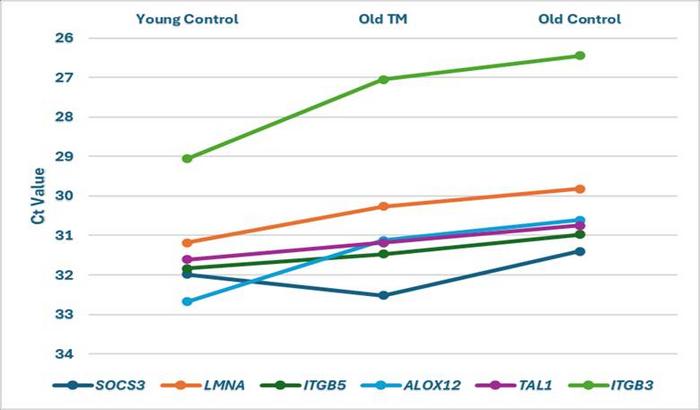The profound effects of meditation on physical and psychological well-being have long been documented, but recent research from a collaborative study involving researchers at Maharishi International University (MIU), the University of Siegen, and the Uniformed Services University of the Health Sciences has unveiled compelling evidence suggesting that long-term practice of Transcendental Meditation® (TM®) may lead to favorable biological markers indicative of reduced stress and aging. The study delved into gene expression patterns, cognitive functioning via electroencephalography (EEG), and hormonal analysis, showcasing a holistic view of meditation’s multifaceted benefits.
In this innovative research, participants were categorized into distinct groups based on their TM practice duration, allowing a focused comparison between those who had engaged in 12 years versus 40 years of TM practice and those who had not practiced meditation at all. This stratification empowered the researchers to paint a clearer picture of the cumulative health benefits resulting from a sustained commitment to TM practices. Not only did this study broaden the exploration of TM’s impact, but it also applied modern scientific methodologies to assess cognitive and biological variables.
Gene expression, a pivotal aspect of biological function that can provide insights into aging and stress, was a primary focus of the research. Among the various genes evaluated, the study specifically highlighted the expression of the SOCS3 gene, which is intricately linked to inflammation and chronic stress pathways. Notably, TM practitioners exhibited reduced SOCS3 levels compared to non-meditators—a potentially significant finding that suggests an underlying mechanism by which TM may facilitate healthier aging. In essence, lower levels of inflammation-associated gene activity such as SOCS3 could imply a diminished allostatic load—a factor reflecting the body’s chronic stress burden.
The relationship between physiological markers and cognitive performance was another salient aspect of this investigation. Using EEG technology, researchers assessed cognitive processing speeds through latency measurements of N2 and P3 evoked potential responses. The results indicated that older TM practitioners had cognitive processing speeds that were surprisingly comparable to younger individuals, a finding that defies typical age-related cognitive decline expectations. The Brain Integration Scale (BIS), a comprehensive tool measuring various cognitive performance aspects including attention and reaction times, further corroborated these findings, showing notably higher scores among TM practitioners in both younger and older demographics.
Another noteworthy outcome of the study centers around cortisol and cortisone levels, critical hormones involved in the body’s stress response. Hair samples from participants were analyzed to measure these hormones, revealing a significantly lower ratio of cortisol, the active stress hormone, to cortisone, its inactive precursor in TM practitioners compared to their non-meditating counterparts. This disparity suggests that TM practitioners may possess greater resilience to stress, enabling them to navigate life’s challenges with a more robust biological stance. Prolonged high cortisol levels have been associated with various adverse health outcomes, including cognitive decline, making this finding particularly relevant in discussions around stress management and healthy aging.
By examining these biological and cognitive factors, the research underscores the holistic impact of long-term TM practice, offering a compelling narrative about how meditation could play an integral role in promoting not only mental clarity but also profound physical health benefits. This contribution to scientific understanding of TM aligns with previous studies that have sought to quantify the health benefits associated with meditation, further solidifying its credibility as a practice with far-reaching implications for health and wellness.
When viewed in context with prior research, this study not only reinforces the idea that meditation can contribute positively to health but also opens avenues for future inquiries into the biological mechanisms underpinning these benefits. With a growing body of evidence pointing toward meditation as a powerful tool for enhancing resilience and reducing stress, this research provides an impetus for a deeper exploration of the connection between mindfulness practices and biological aging.
Exploring the biological pathways involved in the observed changes will be essential in delineating the mechanisms through which TM exerts its benefits. Researchers anticipate future studies will investigate how energy metabolism and inflammation pathways interact with meditation practices, thereby contributing further to evidence supporting meditation’s role in health promotion. These explorations might lead to new insights that could refine therapeutic approaches to managing stress and aging more effectively.
As research continues to unfold in this fascinating area, the potential for meditation to reshape understandings of health and longevity cannot be understated. The convergence of cognitive science, biology, and mindfulness practices represents a promising frontier in improving individual health outcomes while fostering a broader societal appreciation for practices that support mental and physical well-being.
The implications of these findings extend beyond individual health, suggesting that widespread adoption of TM and similar meditation practices could have transformative effects on public health. As further investigations are undertaken, it may become increasingly evident how integrating such practices into daily life can provide a buffer against modern stressors and the biological aging process.
In conclusion, the insights gained from this collaborative study signal a vital step forward in understanding the intersection between meditation practices and biological health. As evidence mounts supporting the benefits of long-term TM practice, a greater emphasis on meditation within health care programs may inspire more individuals to consider adopting these practices as a means of promoting resilience and aging gracefully.
Subject of Research: People
Article Title: Possible Anti-Aging and Anti-Stress Effects of Long-Term Transcendental Meditation Practice: Differences in Gene Expression, EEG Correlates of Cognitive Function, and Hair Steroids
News Publication Date: 20-Feb-2025
Web References: https://www.mdpi.com/2218-273X/15/3/317
References: http://dx.doi.org/10.3390/biom15030317
Image Credits: Maharishi International University
Keywords: Transcendental Meditation, gene expression, inflammation, cognitive function, resilience, aging, cortisol, health benefits, mindfulness, stress management.




